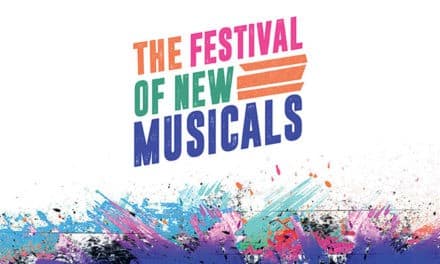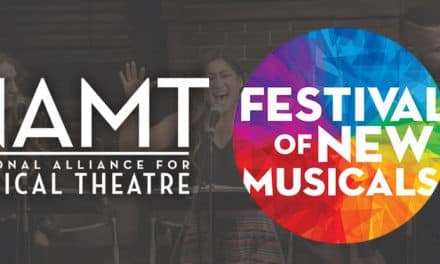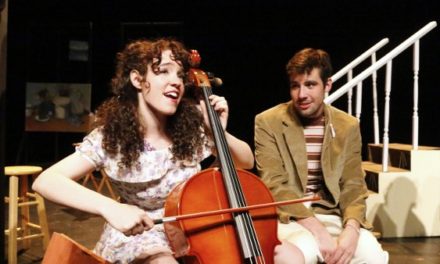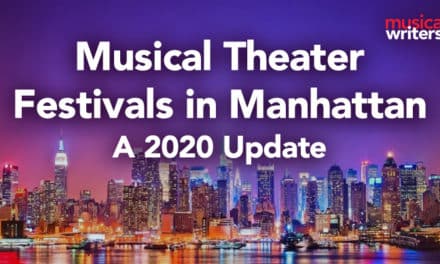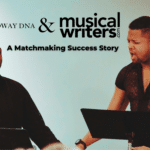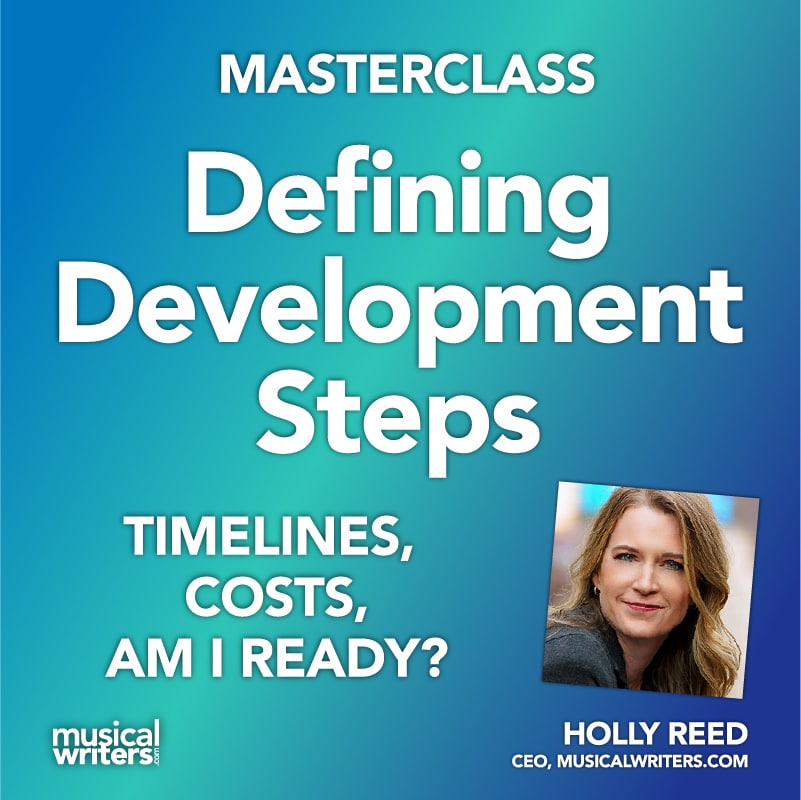Once a musical is ready to be heard, many writers consider submitting their show to a theater festival, such as NYMF (The New York Musical Theatre Festival), various Fringe festivals, Midtown International Theatre Festival, Planet Connections Theatre Festivity, and others (see listings on the festivals page).
Festival Considerations

Left: MusicalWriters.com panel “Inside NYMF and Other Festivals” – July 2015. Front row: Jessica and Jared Field; Back row: Eric Sirota, Matt Gurren, Carol de Giere, William Squier. Right: Audience members and panelists.
If a musical is accepted to a festival, it has a chance of being seen by an audience for a few performances and possibly being noticed by producers. It may be reviewed, so the writers can begin to collect quotes to use for future marketing. However, there are reasons to be cautious about productions staged in context of a large group event. In order to answer questions about what’s worth doing and what are the hidden risks, I invited a panel of writers to speak about their festival experiences. On the final weekend of the 2015 NYMF, twenty people attended this MusicalWriters.com-sponsored event.
I’m providing an edited transcript of the discussion in two segments. In this document, Part I, we hear from Matthew Gurren, the book writer and co-lyricist of What Do Critics Know? (music by Gurren and James Campodonico) along with Jared and Jessica Field, the writers of Rachel: A New Musical.
Part II (read here) includes material from Eric Sirota, writer of Your Name on My Lips and Day of Wrath; William Squier, MusicalWriters.com contributor and the bookwriter-lyricist for multiple musicals that have been in festivals; and several other writers who contributed experiences by email.
The New York Musical Theatre Festival Experience of Matt Gurren
Carol de Giere: What I’m hoping we’ll do today is definitively decide if it’s worth doing festivals. I’m kidding of course, but I think we need to know the pluses and minuses. It’s a big plunge to take. Matt – would you start out, since you’re in NYMF now [at this point Matt’s show had been performed three out of its five performances]. What has it been like?
Matthew Gurren: I really wanted to be part of the NYMF festival because I’ve gone to it for a couple of years and was very impressed with the quality of work, and I liked the venue. It just seemed very prestigious. When we were selected for the NYMF Next Link program I didn’t hesitate to say yes, though I did read the contract carefully beforehand. There are some negatives to the festival, but one of the great things is that I went into it knowing what it was. I met with other NYMF writers from previous years before officially signing on. They said it was good but they probably wouldn’t do it again.
It relies a lot on you. I viewed it as a crash course in grad school. I think you have to look at it as kind of a final thesis. It really does give you every sense of what it’s like to put on a musical. People who are writers can write a musical, but here you and your collaborator have to be your own producer. You have to have to raise funds, cast it, and find a production team. It’s not all good but it was all a good learning experience. It gets you ready for everything in trying to push and promote the show, market it, etc.
One of the great things about NYMF is that people know what it is. If you tell people in the theatre industry that you’re in the New York Musical Theatre Festival, they will know what you’re talking about. They will know it’s an honor to be in NYMF because hundreds of people apply every year and you got selected. So rather than saying I’m renting a black box theatre 8 flights up somewhere and I’m going to invite people to it, you’re in an established festival. The festival has its own events that they plan. They’ve got an event where your cast can sing, they have a press conference, and they have their own press people who come in. So the festival has a lot of things to it to promote.
I think it’s also good because they do have membership, and have people who come so it’s not just your friends and family who are coming to see the show. It’s actual NYMF patrons and passholders, so you get a very good sense of how your show goes. What’s cool is that we got a lot of pre-press. We got listed on Ken Davenport’s top 5 musicals to see at NYMF, Playbill.com, Backstage.com, the NY Theatre Guide – listed as #3 of the top 5 shows of the week. So it was great to get some of that attention. Then it’s so rewarding too, I love the Griffin Theater, which is where we are at the Signature Center. It’s a beautiful venue. It feels really nice to not be in a theatre basement. It looks very professional and the sound quality was great. The staff of the New York Musical Theatre Festival are nice and if you are a Next Link show, you get a dramaturg who helps you massage the show and give you pointers. They had a great conference that you got to go to for two days where you meet casting directors, producer types, general managers, and all sorts of people who tell you about the NYMF experience and strategies.
Carol: Didn’t you also get $5000?
Matt: Being a Next Link show we did get $5000. For a $58,000 budget, that’s kind of a small percentage. We were a big show with a cast of 13. NYMF shows are not cheap. That’s one of the drawbacks. Unless you are lucky enough to have a producer who says I want to take your show to NYMF, you’re responsible for raising that money, calling up your relatives and friends, doing a Kickstarter campaign, and tons of other things.
It’s also important because you have to be your own vehicle in this business. You can’t wait for a theater to pick you up or for a producer to walk up to you and say, ‘Hey, I want to bring you to Broadway,’ because that’s not going to happen. It might, but if you’re realistic, you have to be your own engine before you get your break. The NYMF festival is a comprehensive way to understand everything from hiring people, to delegation, to expenses, budgets, e.g. you might not be able to get a star performer if they are going to charge you $5000, you just can’t afford it.
There is a NYMF contract and it requires that Equity actors get a certain amount that includes health benefits and 120 hours of rehearsals, which is great because that’s 5 days a week for roughly 6 hours for 4 weeks, and it also includes the 5 performances. If you extend or get extra performances, which may be an option, (we declined for financial reasons), you pay them a small fee on top of their contract rate. If your actors are non-equity you can pay them whatever you want, but we tried to be fair because those people are putting in just as much time and effort.
You can do a staged reading for 29 hours, but they will have script in hand and it’s really nice to have the full staging. We lucked out with our cast. None of them are big names but they are all wonderfully talented at what they do.
Scott [another writer who was attending the panel]: Did you serve as your own director?
Matt: No, I learned that’s not a good idea, especially when you’re starting out. You really want to be the writer in that room and not be busy doing other things. We had a great director named Michael Bello.
Carol: How did you find him?
Matt: We had done a staged reading before but had to fire our former director due to artistic and contractual disagreements, and he took his whole team with him. So we basically found a whole new production team, through connections and sending the script out to people who came recommended to us, and that’s how we found Michael. He was great.
Paul [another writer in the audience]: When you applied through NYMF did you have a specific goal?
Matt: Absolutely. I’m a new emerging writer. People don’t know who I am. NYMF is a great way to get you a little more recognized and have something to put down on the resume, which is a great thing. My goal was to put a show up and make it the best it could possibly be. NYMF always asks, What’s your goal? I think you have many goals. The first is how the heck do I make the show the best it can be? The next is how do I raise this money? Then, how do I get the best production team together; best cast? Then how do I sell out our performances? And lastly, who can I get in the audience (ie producer types/theater owners) who might take the show forward?
We basically have a sold out run, which is great for a 200 seat theatre and 5 performances. NYMF is expensive in part because you have to use their equipment, venues, services a lot of times which is unfortunate since you could save money if you had someone lend you mics or a projector – but they have their own clients that they have to keep happy too. It’s $1000 for this, e.g. you have to use their equipment. It’s all in the contract. The contract is very binding. If your show is lucky enough to get picked up, they do get a percentage after $50,000 is earned (your earnings) for 10 years. You can set up an LLC, which I did. But it didn’t help me getting out of being bound to the contract.
New York Musical Theatre Festival and Fresh Fruit Festival participants Jared and Jessica Field
The Fresh Fruit Festival has been running for several years in NYC. It is presented by All Out Arts “to celebrate the LGBTQ community’s unique perspective, creativity & diversity, and to build links between the LGBTQ artistic communities, be they local or international.”
Carol de Giere: We have Jared and Jessica, brother and sister team, who had a New York Musical Theatre Festival show in 2014 as a developmental reading: Rachel: A New Musical, about Rachel Carson. This year they’ve brought Rachel to the Fresh Fruit festival. So, why and how?
Jessica Field: The cost of a full production at NYMF is so daunting. They ask you to re-apply after a reading but looking at 50-60 thousand dollars was not something even remotely possible for us.
Jared Field: Fresh Fruit Festival doesn’t have its own special contract with Equity so we did it as Equity Showcase, which allowed us to pay just travel expenses for the actors.
Jessica: We paid a little extra. It’s hard to find the balance in wanting to value your actors and saying, what’s possible for me as just a writer and not a producer, just an acting producer, so we tried to strike a balance as best we could.
Carol: Let’s go back. What was the benefit of the New York Musical Theatre Festival for you and did it still cost a lot of money?
Jared: Not as much because we did the developmental reading, which ran about $6000, that’s for paying actors and everything you need, in 29 hours.
Jessica: That’s for 1 week for getting the reading done. For us it was mostly learning the music, which is very difficult and plentiful. The best part about that is that you start about a month in advance with your dramaturg and you go through the script and work songs together. We rewrote 17 songs! For us the great benefit was making a show that we wanted, where we felt like we were starting out with this historical play and it was very “historical” and we wanted to get closer to “play.” And we did.
Carol: Did they give you a dramaturg?
Jessica: Yes. She stayed with the show and we’re still working with her today.
Matthew [another writer in the audience]: Where do they find the dramaturgs, and are they good?
Jared: Our dramaturg went to our alma matter, Brandeis. She’s fairly young and new in the field but very talented and experienced with NYMF. I think she’s head of the developmental reading festival now. She’s not a big name but someone who really cared about us and took a lot of time to work with our show, and we found her advice really spot on and astute. Jessie spent a whole year doing research on Rachel Carson, reading all the books, so she was the Queen of facts.
Jessica: It’s hard to let go of some of that stuff when you want to tell a story that’s true, and what I had to ultimately find was the “truth” without being married to the facts. It used to be three hours and now it’s 2 and I don’t miss a thing.
Jared: The great thing about this story is it’s all Jessie’s idea, she found it, and saw the arc right away, saw the drama in it. For our first musical, this is our first collaboration, it was great to have that structure to develop our own story through the existing material that really is remarkable.
Jessica: So we chose the Fresh Fruit Festival because it was much more affordable. There was just a $150 security deposit that we will get back. It’s at the Wild Project Theater [in the East Village]. It has 89 seats. [Someone asks about any LGBT requirements.] You either have to be gay or your work has to be LGBT related, so there are options.
Carol: One thing I’ve heard from people is that some festivals have this weird schedule where your show would be at like 11:00 at night and 2:00 in the afternoon and no one comes.
Jared: The Fresh Fruit Festival tries to give everyone fairly good times. Our worst time was Weds at 8:30 pm, and even that was almost sold out. The worst part has been that it’s tightly packed. On Monday night we had a show at 7 pm and someone else’s show was supposed to start at 9:00 pm and we were running two hours. The other thing about a smaller festival is that, though they give you a lot of support, they don’t have as much support to give so it was sometimes hard to get in touch with them. We asked about the time slot and we never heard back from them but it worked out.
Jessica: Times weren’t really a problem. Our music director is doing a show at the New York Fringe Festival and I know he’s having some trouble with that. Some of his shows are at 5:45 in the afternoon, which feels really strange. But the nice thing about being in a small festival was that there were only seven shows in it, so I don’t think anyone really got screwed with times.
Scott: Do you have a vision of a type of show you’d bring to NYMF or another festival versus a type of show that you wouldn’t bring to a festival?
Jessica: I think small sets are a must!
Matt: At NYMF they provide you with a 4 x 4 x 8 ft storage space, which is very small, so unless your set and costumes can fit into that space, your show will have to scrap stuff or, in some cases, get fined. The set for my show, What Do Critics Know?, consisted of 3 road cases which were used for various locations. They joined together to form a press conference table in one scene and served as tables in a supper club for another. While the set constraints can be annoying at first, the solutions can be very creative. It’s amazing what a little bit of lighting and a suggestion of a set will do. Not only is it affordable, but theater relies on imagination. Audiences are very smart and creative and they’ll know exactly what you’re going for.
Click here for Inside NYMF and Other Musical Theatre Festivals – Part 2


